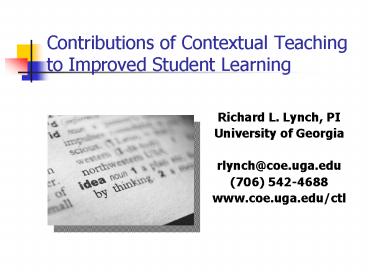Contributions of Contextual Teaching to Improved Student Learning - PowerPoint PPT Presentation
1 / 22
Title:
Contributions of Contextual Teaching to Improved Student Learning
Description:
Contributions of Contextual Teaching to Improved Student Learning Richard L. Lynch, PI University of Georgia rlynch_at_coe.uga.edu (706) 542-4688 www.coe.uga.edu/ctl – PowerPoint PPT presentation
Number of Views:216
Avg rating:3.0/5.0
Title: Contributions of Contextual Teaching to Improved Student Learning
1
Contributions of Contextual Teaching to Improved
Student Learning
- Richard L. Lynch, PI
- University of Georgia
- rlynch_at_coe.uga.edu
- (706) 542-4688
- www.coe.uga.edu/ctl
2
Study of Novice Teachers
- to better understand the applications of CTL
strategies in actual teaching contexts and how
this might affect teaching and learning. - In effect, does CTL
- Enrich subject matter
- Engage students in learning
- Increase student mastery of subject matter
3
What does it mean to achieve?
4
Why CTL?
- Research on Teaching and Learning
- The New Economy
- Issues of Diversity
5
The ModelFoundations Teaching Practices
Classroom as community
Constructivism
Self Direction
Authentic Assessment
Situated Cognition
UGA CTL Teachers
Society
Diversity
Cognitive Science
Prior Knowledge
Real world
Cooperation Discourse
Motivation Theory
Multiple context
Active learning
6
Illustrative Teaching Approaches
- Problem-based Learning
- Project-based Learning
- Inquiry-based Instruction
- Work-based Learning
- Service Learning
- Collaborative or Cooperative Learning
- Authentic Assessment
7
Study of Novice Teachers
- to better understand the applications of CTL
strategies in actual teaching contexts and how
this might affect teaching and learning. - In effect, does CTL
- Enrich subject matter
- Engage students in learning
- Increase student mastery of subject matter
8
Research Methods
- Case studies
- Classroom observations, interviews, document
analysis, seminars with novice teachers - Surveys of middle and high school students in
novice teachers classes and focus group
interviews with them - Cross-case analysis
- Considerable triangulation of data and findings
9
Key Findings Differences in Teaching Practices
- Active learning
- More movement, noise, fast paced
- More interaction between teacher and students and
among students mentoring, nurturing environment - More student-focused, considers diversity
teacher knows students, meets individual needs
for learning
10
Key Findings Differences in Teaching Practices
- Uses community/workplaces as sources of
knowledge, project-oriented teaching, real-world
contexts - Students own their learning, authentic
assessments - Less reliance on texts, lecture, memory,
note-taking, drills, and tests of recall - Multidisciplinary emphasis
11
Key Findings CTL Strategies Commonly Used
- Hands-on activities
- Student collaboration
- Community involvement
- Real-world connections
- Project- and problem-based learning
- Self-directed and inquiry learning
- Authentic assessments
- Use of technology
12
Key Findings - Facilitators to Using CTL
- Teachers beliefs and preparation in CTL
- Positive responses from students
- Block schedule allowing more time
- Support and resources peers, administrators,
other teachers - Technology availability
- Training in college pre-service teacher
education, role models, internships
13
Key Findings Barriers to Using CTL
- Subject matter requirements
- Time to develop, prepare, offer
- Lack of administrative support, funds
- Student apathy, lack of preparation
- State curriculum, texts, testing
- Classroom management concerns
- Parents role
14
Key Findings Effects of CTL on Student
Achievement
- Students stay on task, more attentive,
interested, cooperative - Better recall of materials
- Students more motivated, connected, say they
learn more with CTL - Higher levels of learning process skills
- Metacognition making sense of content,
reflection, self-assessment
15
Key Conclusion
- While the eight novice teachers implemented CTL
strategies in unique ways, all data indicated
that CTL strategies enhance student engagement
and metacognition and thus improved student
achievement and content mastery.
16
Conclusions
- Theory of CTL supported
- Students said they learned a lot more and
regarded the work of these teachers highly - All saw strategies as contributing to success
- Barriers and facilitators were aplenty
17
Conclusions
- Standardized testing and mandates to stay on
task, cover the material, stick to the
textbook (or guide) were frequent impediments,
especially in core academic courses - More extensive use of CTL strategies in elective
courses, especially service- and work-based
learning - Novice teachers believed in CTL
- Students valued it
18
Conclusions
- Teachers saw great transfer of strategies to
nonschool environments - Effects on standardized testing warrant further
study effects on other measures of student
achievement seemed high further study of
critical connection between instructional
strategies and student achievement is warranted - Teaching involves great complexity
19
Related Empirical Studies
- Students whose teachers emphasize higher-order
thinking skills (math) and hands-on learning
activities (e.g. lab science) out perform their
peers significantly (ETS, 2000) - Students whose teachers receive professional
development on CTL strategies in working with
special populations outperform their peers by
more than a full grade level (ETS, 2000) - Studies of the brain indicate that learning
occurs faster and more thoroughly when what we
are learning is presented in meaningful contexts,
rather than as fragmented facts (Caine Caine,
1991 Resnick, 1995 Hughes, Bailey, Mechur,
2001).
20
Related Empirical Studies
- Where subject is taught in multiple
contentsstudents are more likely to abstract the
relevant features of concepts and to develop a
flexible representation of knowledge (Branford et
al., 1999). - Evidence indicates that when students are
actively engaged in real issues they are more
motivated to master content (as cited in MPR,
2002). - Students improved remarkably in performance in
both math and social studies classes taught with
authentic pedagogy i.e., instructional practices
rooted in the real world (Newman et. al., 1992,
2004). - Evidence indicates that when instruction draws on
students pre-existing understandings, interests,
culture, and real-world experiences, the
curriculum becomes more meaningful to them
(National Research Council, 2004).
21
What does it mean to achieve?
- Theoretical and common sense
- Empirical
- Personal and societal goals
- Indicators of success
- measured vs. actual
22
- Questions and Discussion































